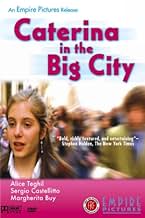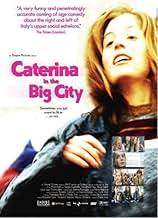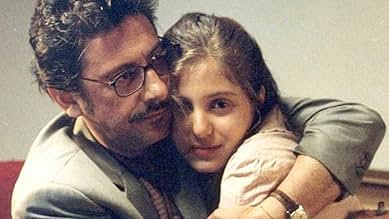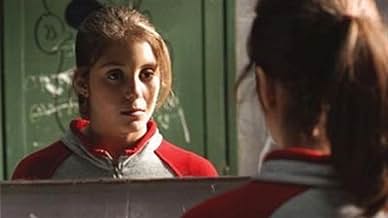IMDb RATING
6.8/10
3.2K
YOUR RATING
Caterina, forced to leave her small town at the age of thirteen, faces the complications of living in the big metropoly of Rome.Caterina, forced to leave her small town at the age of thirteen, faces the complications of living in the big metropoly of Rome.Caterina, forced to leave her small town at the age of thirteen, faces the complications of living in the big metropoly of Rome.
- Awards
- 7 wins & 9 nominations total
Zach Wallen
- Edward
- (as Zach -James Smith- Wallen)
Margerita Mazzola
- Martina
- (as Margherita Mazzola)
Martina Tasquetta
- Alessia
- (as Martina Taschetta)
Giulia Gorietti
- Giada
- (as Giulia Elettra Gorietti)
- Director
- Writers
- All cast & crew
- Production, box office & more at IMDbPro
Storyline
Did you know
- TriviaSara Pallini's debut.
- GoofsThe story begins in 2003, but the dates do not match up with the days of the week for that year.
- ConnectionsReferences The Blues Brothers (1980)
- SoundtracksInno ufficiale dei giovani fascisti
Music by Giuseppe Blanc and lyrics by Vittorio E. Bravetta
Sung at the wedding reception
Featured review
'Caterina va in citta' ('Caterina in the Big City') is an Italian film that takes as its storyline the coming of age of a young teenager transported by her family from the quiet Tuscany seaside village of Montaldo Di Castro to the challenging realities of Big City Rome, but that is only the means to an end of exploring Italian politico-social life and its effects on the youth of today. It comes very close to drowning in its own excesses, but at the root of the film is a sensitive tale of a young girl's struggles with growing into an adulthood that puzzles, frightens and challenges her.
Caterina (Alice Teghil) finds her greatest moments of happiness in her home town singing mezzo soprano in the choir: simple pleasures in a simple setting surrounded by country folk content to live life day to day. Her father Giancarlo (Sergio Castellitto) is a teacher who can't hold a job, partially because he is so outspoken and partially because he is a raving truly obnoxious person. Her mother Agata (Margherita Buy) is subservient, a woman with few coping mechanisms who allows her odious husband to run an abusive household. Giancarlo's aunt is ill in Rome and with the idea of finding a job where his talents are respected, Giancarlo uproots his little family and moves to the big city. There the social castes are evident and Caterina is judged a country hick until she is befriended by first a rebel who bonds with Caterina, introduces her to tattoos and liquor, and causes a schism between her important mother (Giancarlo hoped to have is novel published by the woman), the daughter and his family. Caterina then is absorbed into the rich and spoiled rank and file of the wealthy, not fitting in until the girls do a make over. That situation is again disrupted by Giancarlo's blindly inappropriate behavior. The true Caterina is somehow lost, still dreaming of becoming a fine mezzo soprano, but tagging along with the crowd du jour. Ultimately Giancarlo's multiple and consistent failures drive him away from the family, he rides off to oblivion on his restored motorbike, and Agata and Caterina both bloom.
The noise level of this film is such that it is difficult to watch: the young girls means of communication is a mixture of screaming, loud talking, and fighting and otherwise making us uncomfortable. Yet underneath all of the political and social expose and brandishing is a truly wonderful young Caterina whose life as a soap opera is watched tenderly by an Australian boy who plays the guitar and observes her family from a window across the way from Caterina's Rome home. The moments toward the end of the film when the playback comes justifies the fuss of getting there.
This is not a film this viewer would sit through again, but reflecting on the story after all the commotion is over, hearing Mozart's 'Ave Verum Corpus' and Verdi's 'Nabucco" etc as the inspiration behind Caterina's honest dreams, makes is a more memorable experience. In Italian with English subtitles. Grady Harp
Caterina (Alice Teghil) finds her greatest moments of happiness in her home town singing mezzo soprano in the choir: simple pleasures in a simple setting surrounded by country folk content to live life day to day. Her father Giancarlo (Sergio Castellitto) is a teacher who can't hold a job, partially because he is so outspoken and partially because he is a raving truly obnoxious person. Her mother Agata (Margherita Buy) is subservient, a woman with few coping mechanisms who allows her odious husband to run an abusive household. Giancarlo's aunt is ill in Rome and with the idea of finding a job where his talents are respected, Giancarlo uproots his little family and moves to the big city. There the social castes are evident and Caterina is judged a country hick until she is befriended by first a rebel who bonds with Caterina, introduces her to tattoos and liquor, and causes a schism between her important mother (Giancarlo hoped to have is novel published by the woman), the daughter and his family. Caterina then is absorbed into the rich and spoiled rank and file of the wealthy, not fitting in until the girls do a make over. That situation is again disrupted by Giancarlo's blindly inappropriate behavior. The true Caterina is somehow lost, still dreaming of becoming a fine mezzo soprano, but tagging along with the crowd du jour. Ultimately Giancarlo's multiple and consistent failures drive him away from the family, he rides off to oblivion on his restored motorbike, and Agata and Caterina both bloom.
The noise level of this film is such that it is difficult to watch: the young girls means of communication is a mixture of screaming, loud talking, and fighting and otherwise making us uncomfortable. Yet underneath all of the political and social expose and brandishing is a truly wonderful young Caterina whose life as a soap opera is watched tenderly by an Australian boy who plays the guitar and observes her family from a window across the way from Caterina's Rome home. The moments toward the end of the film when the playback comes justifies the fuss of getting there.
This is not a film this viewer would sit through again, but reflecting on the story after all the commotion is over, hearing Mozart's 'Ave Verum Corpus' and Verdi's 'Nabucco" etc as the inspiration behind Caterina's honest dreams, makes is a more memorable experience. In Italian with English subtitles. Grady Harp
- How long is Caterina in the Big City?Powered by Alexa
Details
- Release date
- Country of origin
- Language
- Also known as
- Caterina flyttar till stan
- Filming locations
- Production companies
- See more company credits at IMDbPro
Box office
- Gross US & Canada
- $296,464
- Opening weekend US & Canada
- $9,352
- Jun 5, 2005
- Gross worldwide
- $4,407,426
- Runtime1 hour 47 minutes
- Color
- Sound mix
- Aspect ratio
- 2.35 : 1
Contribute to this page
Suggest an edit or add missing content

Top Gap
By what name was Caterina in the Big City (2003) officially released in Canada in English?
Answer









